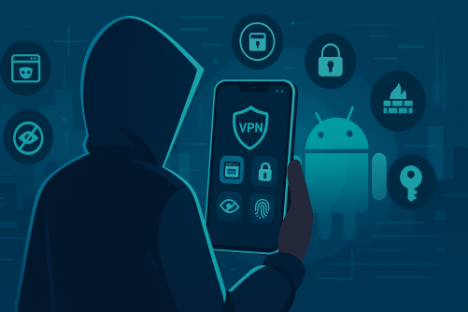Your Android phone knows a lot about you â and so do the apps, networks, and services it connects to. From tracking your location to collecting your browsing habits, privacy is constantly at risk.
If you want to keep your digital life to yourself, you’ll need the right tools. In this guide, we’ll walk through seven essential apps and features that help Android users stay anonymous, secure, and in control in 2025.
Why Mobile Anonymity Matters More Than Ever
Android is the most widely used mobile operating system globally â and also one of the most targeted. Between third-party apps, unencrypted networks, and aggressive ad trackers, Android users face constant privacy vulnerabilities. In 2025, concerns about surveillance, profiling, and identity theft are growing â and users are becoming more privacy-aware.
Unfortunately, Android’s default settings often prioritize convenience over control. App permissions are too broad, background data usage is high, and many users don’t realize just how exposed they are until it’s too late. The good news? With the right tools, you can turn your Android device into a much more private and anonymous space.
1. VPN for Android â Your First Line of Defense
A Virtual Private Network (VPN) helps protect your identity by encrypting your internet connection and masking your IP address. This makes it harder for websites, advertisers, and networks to track your activity.
Whether you’re browsing on public Wi-Fi, accessing region-locked content, or just want more control over your digital footprint, using a VPN is one of the most effective steps you can take.
If you’re seeking a reliable option, you can find a free VPN download for Android that offers encrypted connections, an intuitive interface, and strong privacy controls â without compromising speed or usability.
What to Look For in a Good Android VPN:
- Strict no-logs policy
- AES-256 encryption
- Kill switch feature
- DNS leak protection
- Simple, intuitive mobile interface
Free VPNs often come with trade-offs such as data collection, limited server access, or slower speeds. Look for VPN providers that have transparent policies and a proven commitment to user privacy.
2. Private Browsers That Don’t Track You
Many Android users default to Chrome â but it’s deeply tied to an advertising ecosystem that thrives on user data. To browse anonymously, you need a browser built for privacy.
Recommended private browsers include those that block trackers by default, upgrade connections to HTTPS, and delete browsing history automatically. Look for browsers that offer privacy grades, incognito modes, and built-in ad blocking.
Switching to a private browser can drastically reduce how much data is collected during everyday browsing.
3. Encrypted Messaging Apps
Your messages contain more personal data than most people realize â from your contacts and conversations to your metadata and behavior patterns.
The most secure messaging apps offer full end-to-end encryption, do not store metadata, and do not rely on cloud backups unless they’re encrypted locally.
Apps like these are ideal for secure communications, especially when dealing with sensitive topics. Always enable disappearing messages and make sure chat backups are either disabled or encrypted on-device.
4. Secure DNS and Android Firewalls
Every website you visit starts with a DNS request â the process of translating a website name into an IP address. If your DNS requests are unencrypted, your browsing activity can be tracked by your internet provider or intercepted on public Wi-Fi.
On Android, you can switch to a private DNS provider via your network settings. This adds a baseline layer of privacy by routing requests through encrypted DNS protocols.
For more control, firewall apps allow you to block internet access for individual apps, prevent background data usage, and monitor suspicious activity. These apps work without needing root access and provide a powerful way to stop leaks before they start.
To make sure your setup is working correctly, it’s a good idea to run a DNS leak test â this helps confirm that your DNS queries are being routed securely and aren’t leaking through your regular ISP.
5. Password Managers with Local Encryption
Reusing passwords is one of the most common mistakes in personal digital security. A strong, unique password is your first line of defense against unauthorized access â and password managers help you manage them without stress.
Look for password managers that use zero-knowledge encryption, meaning even the service provider cannot access your data. Some apps allow you to store your password vault entirely offline for extra security, while others offer convenient cloud sync with end-to-end encryption.
Most modern password managers integrate with Android’s autofill features, offer biometric login, and alert you to reused or breached passwords.
6. Ad & Tracker Blockers
Many apps and websites are packed with hidden trackers â sometimes dozens per page. These trackers monitor your location, device type, behavior, and even fingerprint your browser settings to build detailed profiles.
System-wide ad and tracker blockers work across all your apps, not just your browser. They filter traffic through custom DNS settings or host file configurations, blocking known trackers and ads before they ever reach your device.
In addition to protecting privacy, these tools can also improve battery life and reduce data usage by blocking unnecessary network requests.
7. Anonymous Search Engines
Standard search engines track everything â from your queries and clicks to your location and device ID. Even in Incognito Mode, your searches are still visible to your search provider and your network.
Private search engines, on the other hand, do not log your queries, profile you based on behavior, or store identifying information. They also prevent search leakage, ensuring that websites don’t know what you searched for to get there.
You can usually set a private search engine as your default in privacy-focused browsers or in your Android search settings.
Bonus Section: Habits That Support Mobile Anonymity
Even the best privacy tools can’t protect you if your usage habits aren’t mindful. Here are a few key practices to maintain long-term privacy:
Weekly Privacy Routine:
- Review and trim app permissions
- Delete unused apps
- Clear cache and browsing data
- Disable location sharing for non-essential apps
System Settings to Adjust:
- Turn off ad personalization
- Use Android’s Guest Mode when lending your device
- Turn off location history
- Disable usage statistics and analytics
For Advanced Users:
- Explore privacy-focused Android operating systems such as those that don’t rely on Google services
- Use split tunneling or Tor over VPN for sensitive sessions
- Avoid installing APKs from unknown sources unless verified
Anonymity isn’t about going off the grid â it’s about limiting exposure and increasing control over what data you share.
FAQ: Android Privacy in 2025
Is Incognito Mode enough to stay anonymous?
No. Incognito Mode prevents your browser from saving local history, but your IP address, device details, and browsing activity are still visible to websites and network providers.
Can I use a free VPN safely?
Most free VPNs operate with limitations or hidden monetization models. Some log user data or inject ads. For consistent privacy, it’s better to choose a VPN with clear transparency practices and independent audits.
How do I know if my privacy tools are working?
You can search for VPN or DNS leak test tools that show your current IP address, DNS servers, and tracking behavior. These allow you to verify whether your VPN is active and whether your DNS queries are properly encrypted.
Final Thoughts
Protecting your privacy on Android doesn’t require technical expertise â just awareness and the right set of tools. With cyber threats and tracking more aggressive than ever in 2025, mobile anonymity is about giving yourself choices and staying in control of your personal data.
Start by changing your browser, adjusting permissions, and setting up a private DNS. Then explore deeper tools like VPNs, encrypted messengers, and tracker blockers to build a strong, layered defense. The more steps you take, the less exposed you become â and the more confidently you can use your Android device without fear of being followed.







